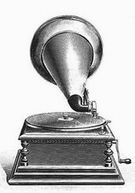| Communities > Stamfordham > Sound | About Contact |

Stamfordham - Sound
Oral History Recording of Mr. J B Spearman (9th August 1978)

Transcription of an interview with Mr. J B Spearman recorded on the 9th August 1978.
Mr. Spearman was born at Eachwick in 1892. His father was a country joiner and builder. In 1905 he started work at Callerton colliery, however he left after only working there for eight weeks to become a mason's labourer. In 1909 he commenced work as a boy hand at Eachwick House Farm. In 1916 he took over the tenancy of a farm in the Wark on Tyne district. Finally in 1924 he took over Heddon Steads Farm. During the full interview Mr. Spearman recalls his varied employment as well as stock and dairy farming in general.
During this extract Mr. Spearman recalls the day he was sent to school in Stamfordham during a terrible snowstorm.
[Transcription]
I started school about five. I went to school at Dalton until I was about seven, that was about a mile and a half. And then I was transferred, the school was closed on account of fever, typhoid fever, was closed for about a year and we were transferred to Stamfordham school. And I had to travel to Stamfordham myself.
That's a distance of about four miles?
About four miles. I remember one morning my father came in and it was snowing, make you laugh. Mother used to always give me warm milk with a drop rum in on a bad morning before I went away to school, and he came in it was snowing.
Mother said this bairn not going to school this morning. Oh he said get away in good time. I set off at seven o'clock and you know I got to school at eleven. So it tells you, the snow was blowing and I was crossing the fields and around about and I eventually got to school. The schoolmaster said "who on earth sent you here" so I said my father sir, he said "well you sit down by the fire, have your dinner and then get away home and go by the road all the way home and don't come back till the snows gone".
This tape recording comes from the large collection of oral history recordings held by the Northumberland Archive Service. Interviews were conducted by Record Office staff from the early 1970's right through until the mid 1980's. The purpose of the recordings was to capture the essence of life in the late 19th and early 20th centuries. Many different subjects were covered, including coalmining, farming, fishing, domestic life, World Wars and entertainment. Over 350 recordings have been collected comprising approximately 700 hours of recollections.